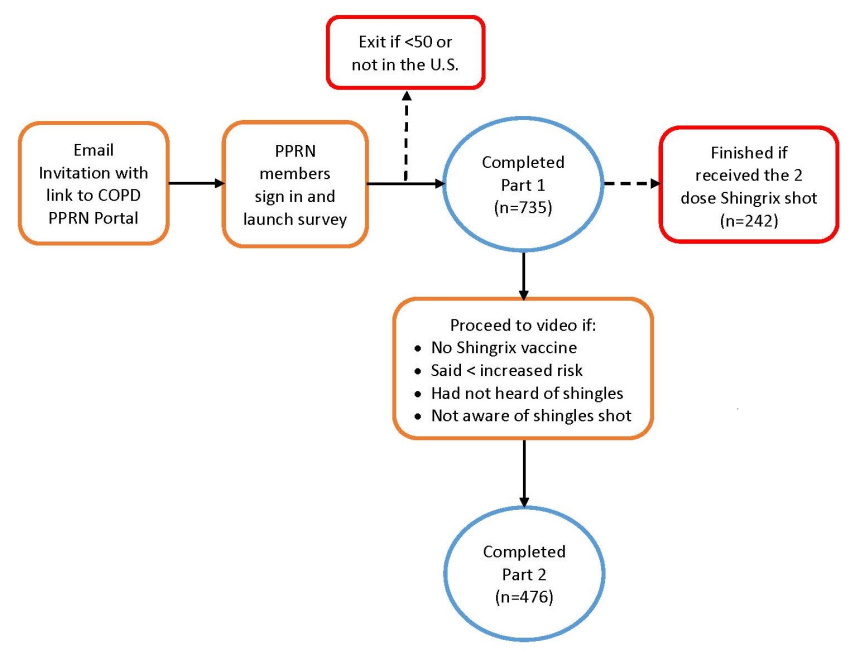COPD Shingles Patient Prevention Study (ShiPPS)
Study Enrollment complete for patients and health care providers
Analysis and reporting in progress for 2Q21
Funded by: GSK as an Investigator-Sponsored Study
COPD Foundation Principal Investigator: Barbara Yawn, MD
Patient Investigator: Debbie Daro and Jan Cotton
Why ShiPPS?
Several studies have shown that individuals with COPD are at an increased risk of having acute shingles (also called herpes zoster [HZ]) as compared to individuals at the same age who do not have COPD. (Reference: Marra F, Panhar K, Huang B, Vadlamudi N. Risk factors for herpes zoster infection: a meta-analysis. Open Forum Infect Dis. 2020;7(1):ofaa005. doi:10.1093/ofid/ofaa005.)
- Shingles is a condition caused by the virus that causes chickenpox. After healing from chickenpox, the virus, called Varicella-Zoster or Herpes-Zoster, stays in the body hibernating, and can be awakened or reactivated in later life to cause shingles. Shingles is a painful blistering rash that can occur anywhere on the body (usually in a "band" on one side). The rash can last from 1-4 weeks, but the pain and other complications may last for a very long time. People who have had one episode of shingles can have another one in the future. The infection is often treated with antiviral and pain medications, but their efficacy is limited. Shingles prevention through vaccination is possible and appears to be the best strategy.
- Although two HZ vaccines have been approved by the US Food and Drug Administration (FDA), the US Centers for Disease Control (CDC) recommends that all healthy adults 50 years and older get two doses of the newer recombinant HZ vaccine (doses separated by 2 to 6 months), to prevent shingles and the complications from the disease.
- More information on shingles and the vaccine is available at: https://www.cdc.gov/vaccines/hcp/acip-recs/vacc-specific/shingles.html
To date there is limited information on HZ vaccine use by people with COPD as well as in-office HZ vaccination and HZ vaccination recommendations from the health care professionals they see for COPD management. Information Is especially limited for vaccine recommendations and practices of pulmonologists, nurse practitioners and physician assistants.
About the study
ShiPPS is designed to help fill the information gap and to explore the impact of including a short HZ informational video embedded in a survey on the vaccine intentions of patients with COPD and the health care professionals providing their care. The study will also collect information on other older-adult vaccines that have had long-standing recommendations for individuals with COPD, specifically influenza (flu) and pneumococcal (pneumonia) vaccines.
This is a one-time survey study conducted in two groups of respondents:
- People with COPD enrolled in the COPD Foundation's COPD Patient Powered Research Network (PPRN)
- Clinicians who care for people with COPD in primary care and specialty settings
Partner Organizations
The COPD Foundation is partnering with the following organizations to support the administration of ShiPPS surveys:
- American Academy of Family Physicians
- American Association of Nurse Practitioners
- American Academy of Physician Assistants
- American Thoracic Society
- American College of Chest Physicians
Results
Patient Survey

This online survey of people with self-reported COPD assessed Herpes Zoster (HZ), also known as shingles, risk awareness, HZ vaccine use and barriers, and the impact of an HZ educational video on vaccine intent. Participants were USA members of the COPD Foundation's Patient-Powered Research Network, aged 50 years or older. Of the 735 respondents (59.6% female, 40.3% male, mean age 68.5 years), 192 (26.1%) participants reported previous HZ. Of those reporting previous HZ, 49 (25.5%) reported increased COPD symptoms during their HZ episodes.
Most participants (94.0%) were aware of available HZ vaccines, but only 33.1% reported ever receiving the Advisory Committee on Immunization Practices-preferred recombinant HZ vaccination. Vaccine recommendations varied by clinician and site they attend: 68.8% received it in primary care office and 26.6% in pulmonology offices.
Most (74.7%) were unaware that COPD increases risk for HZ. Among unvaccinated participants, interest in getting the HZ vaccine increased from 32.0% to 73.5% after watching the HZ educational video, which highlights the need for people with COPD to receive further HZ education, such as the five-minute video, and HZ vaccine recommendations from healthcare professionals.
Read more in the published article:
Citation: Yawn, B.P.; Merrill, D.D.; Martinez, S.; Callen, E.; Cotton, J.; Williams, D.; Loskutova, N.Y. Knowledge and Attitudes Concerning Herpes Zoster among People with COPD: An Interventional Survey Study. Vaccines 2022, 10, 420. https://doi.org/10.3390/vaccines10030420
Or download the PDF: Download
HCPs Survey
Results in progress…
Interested in learning more?
Contact: ShiPPS e-mail: shipps@copdfoundation.org